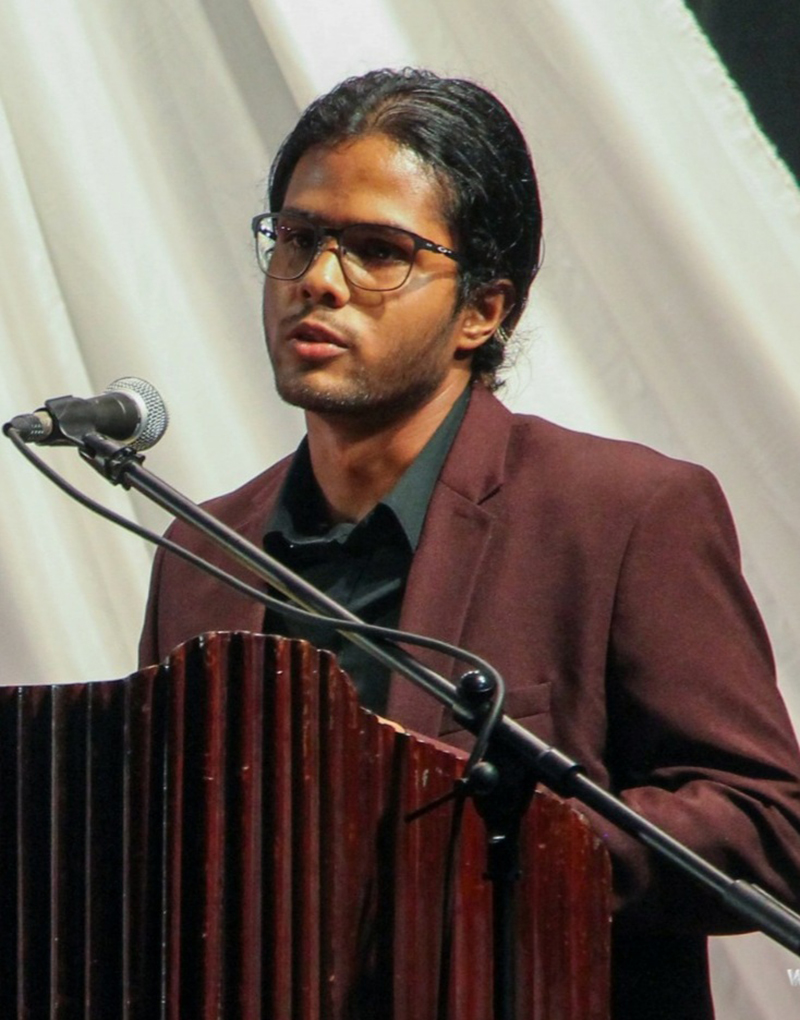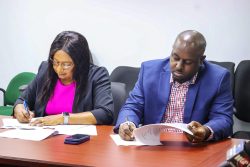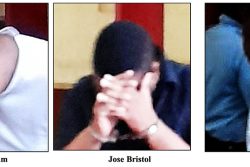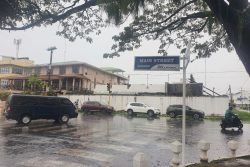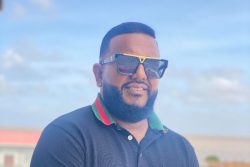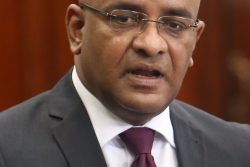Literature is a hobby for science student Samir Mohammed, who won the Guyana Prize for Literature for Short Story and the Guyana Prize for Literature for Poetry, in the Youth Male categories. He intends to continue writing stories and poems and would like to see his work published.
He told this newspaper in an interview that his winning entries were dark. “They are realistic and look at some of the darker underbellies of life,” he said. “I am not trying to sugarcoat anything. I’m trying to get the message out there that people are suffering or people will be suffering.”
His winning short story, “So Does it Stare Back” was his first attempt in that genre. “It is funny I have only one short story and that is the one I won with. This is encouraging and I would like to write some more,” he said. His winning poem was “Blood and Oil”.
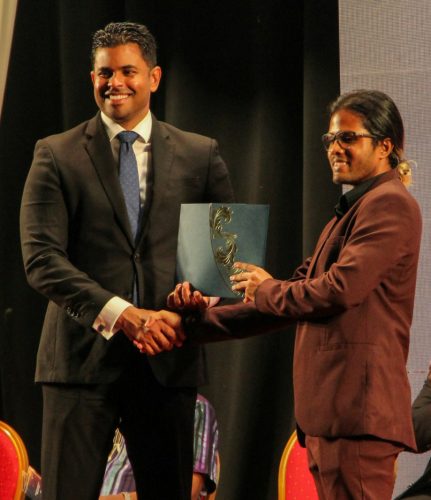
Now 18 years old, Mohammed was 17 when he penned “So Does it Stare Back”, which took its title from a Friedrich Nietzsche quote, “And if thou gaze long into an abyss, the abyss will also gaze into thee.”
With themes of isolation, religion and suicide, Mohammed explained that at face value the protagonists in the story are sent on a mission to the moon as penance for crimes committed on earth. The major conflict in the story is that the protagonists drift off course without realizing it.
“We are taken on this narrative of the protagonists trying to understand themselves and understand their position in the world. How the smallest of mistakes is subject to the mind. In the same way they were confined to the vehicle transporting them to the moon, they were confined to their minds. That is looking at the story at face value and from an outside perspective. If you dig a little deeper, there is a lot hiding beneath the surface,” he explained.
A paragraph reads, “Sometimes it feels like I’m drifting into something that is more than myself, a small component in a massive computer and I wonder … Why do I have to endure this purgatory? No human could live in such a state. Was I even human or was I reduced to a shell of myself?”
Mohammed’s objective in the story was to mirror issues of mental health. “Many times people who suffer from bad mental health hide away in their own minds. They feel imprisoned. On the surface they may look fine but below the surface they are entrapped in their minds with no means of escape,” he noted.
Asked how a 17-year-old was focused on mental health, Mohammed said, “In our day and age, mental health is a very pervasive issue among the young and old because of societal ills. It is something we cannot hide from nowadays. There is a lot of light being shed on it globally but there are still a lot of blind spots that need to be covered.”
In his story he tried to bring out those blind spots. “I tried to make it visceral so the reader can actually feel what the protagonists were going through. It just can’t be sympathy for this person. If you are a person who suffers from bad mental health, you don’t want others to pity you. That is probably the last thing you want. You want them to understand what you are going through,” he noted.
Asked if anyone close to him had mental health issues, Mohammed said, “I know quite a few people, but my writing is a combination of both my experiences and their experiences.”
He has experienced the feeling of being caged in. “You can’t escape your mind no matter how you try to run from it. In the story the protagonists are physically confined.
No matter what they do they cannot escape from where they are. In trying to escape the protagonists come undone as though their minds were an envelope,” he stated.
Blood and oil
“Blood and Oil” has its genesis in the excitement and anticipation surrounding the start-up and the economic boom expected from the country’s burgeoning oil industry.
“It might appear contentious depending on how you look at it. I wanted to shed light on certain aspects of corruption and the possible dangers inherent in the developmental process of the industry. It isn’t undermining the supposed benefits that are supposed to come with it. I didn’t see all goodness in it. I wanted to sound a warning,” he said.
One of the verses reads:
“There is oil in our veins
In our hearts steel
When we lose humanity
And forget how to feel.”
Mohammed said history has proven that a lot of bad things can come from the exploitation of this natural resource. “If you don’t learn from history you’re doomed to repeat it. The same way when blood or oil gets on your hands, it is very difficult to get it off. You can scrub it under a pipe and the oil and blood is difficult to take off, especially when it’s on the clothes. That is a metaphor if there is a failure or an issue,” he said.
Ever since he won the prize for poetry, people who know him, ask him to recite it for them.
He always writes poems whether he has an objective or not.
“I fear some of the poems I have are too dark for out there. They might see the sun and shrivel up like a fragile plant or something,” he said.
His poems, he said, are a reflection of himself. “I am thinking, if these are my works people will think what kind of a person am I. I try to shed some light on the darker end of the spectrum. This is a way of purging myself to get the darkness out and into the light. I would encourage young writers to do the same. If they are struggling with any mental issues, get it on paper. It makes a world of a difference. Have your piece and analyse it. See what parts are you and see what parts are irregular thinking patterns which might be unhealthy to you. That is the magic of writing. It is revealing. When you let the words flow it comes out. Then you are the better person at the end of the day,” he advised.
With no writers’ forum locally, Mohammed said he has been trying to encourage the UG art club to create a dedicated space for writing. “It appears they are closed off to that. They just want visual art. I have not been able to get through to them so it looks like I will have to work towards forming a writers’ forum,” he said.
When the Guyana Prize for Literature was announced, Mohammed, who has been writing poems since he was in primary school and has a collection of over 130, immediately started going through some of his work.
“I had poems I had already written but I didn’t think they were prize winners. These two pieces were meticulously crafted to fulfil that need. The messages were there swimming in my head and this Guyana prize was the inspiration and the avenue to get them out,” he said.
“It is weird having a lot of older folks telling me I have talent. I don’t think I recognize that as yet. Winning the prizes still feels alien to me.”
Mohammed is from Better Hope, East Coast Demerara and is the last of three siblings, two boys and a girl. He also comes from a large extended family with many cousins.
A past pupil of Mae’s Schools and St Rose’s High School, he has won school prizes for literature, physics and mathematics at the Caribbean Secondary Education Certificate (CSEC) level.
“Literature and writing poems are just hobbies; some things I like. I’m mainly a student of science. Creative writing is my hobby and now I am doing some academic writing because I’m studying and it is necessary to do lab reports and so on,” he said.
Mohammed has been writing since primary school. “I used to take printer pages and staple them together to make writing, drawing and comic books. Back then I wrote a lot of silly stuff like going on adventures and fantasy stuff about dragons. I grew out of putting them on paper but I still enjoy my flights of fantasy,” he said.
A lot of his poems live in his computer and have never seen the light of day. “I used to share some online on a poetry website but recently they have just been hiding away,” he said. Publishing them will be a lengthy process and funding will be needed, he noted.
At present Mohammed is studying physics at the associate degree level at the University of Guyana. “I did not do CAPE [Caribbean Advanced Proficiency Examinations] or [General Certificate of Education] Advanced Levels examinations. I came straight from CSEC to UG,” he revealed, adding that UG offers only a two-year physics programme.
What next after the associate degree? He said, “My mind is oscillating between electrical engineering and computer science.”
